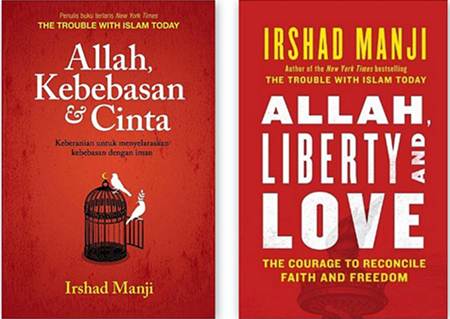These are notes taken down in Court by some of Lord Bobo’s minions of the broad grounds of decision pronounced by Judge Zaleha binti Yusof when she allowed the application by ZI Publications Sdn Bhd quashed the ban on the book Allah, Kebebasan & Cinta (the Malay translation of the English book by Irshad Manji entitled Allah, Liberty & Love).
This is an application for judicial review for inter alia an order of certiorari against the decision of the 1st Respondent absolutely prohibiting the the printing, importation, production, reproduction, publishing, sale, issue, circulation, distribution or possession of” “Allah, Liberty & Love” and “Allah, Kebebasan & Cinta” (“the Book”).
At the hearing before me on 19.08.2013, Senior Federal Counsel (SFC) had raised a preliminary issue on the locus standi of the Applicant in respect of the English version of the Book, as the Applicant was not the original writer or publisher of the English Book, and no evidence was produced that the Applicant was authorized to represent the publisher. He also raised the issue that Article 10 of the Federal Constitution does not apply to foreign citizens. As to the BM version of the Book, there is no evidence that the Applicant has been authorized to translate the English book into Malay.
The Applicant says it only had to show it was adversely affected. The said Order clearly states that the publisher of the English version is Free Press New York. The Applicant is only shown to be the publisher of the BM version.
The English language is obviously published by a non-citizen. Therefore, the Applicant has no locus standi to challenge the English version.
The BM version clearly shows that the Applicant is the publisher. It is not relevant to show that the Applicant is authorized. Being the publisher, I am of the view the Applicant is clearly adversely affected by the banning of the national language version of the Book, and has the necessary locus standi.
Coming to the substantive hearing of the judicial review:
I have perused the cause papers, submissions and various authorities. The Respondent has given the ground in the Order that the Book “is prejudicial to public order and morality”. In its affidavit, the Respondent says that he relied on the report by JAKIM.
Quotes from R’s affidavit as to his reasons for banning the Book.
The Respondent attached various newspaper cuttings regarding protests regarding the Kalimah Allah and Seksualiti Merdeka issues.
The challenge by the Applicant is also based on illegality, irrationality and disproportionality. This Court has the jurisdiction to review the Respondent’s decision: Ramachandran’s case; Ranjit Kaur v Hotel Excelsior
No doubt s. 7(1) of Act 301 has given the Minister absolute discretion to decide, but that does not mean his discretion cannot be questioned if it can be shown that he has abused his discretion.
Quoting the Sri Lempah case, “every legal power must have limits, otherwise we will have a dictatorship …”
The Minister’s Order says it “is prejudicial” and not “likely to be prejudicial”. This choice of words is important. The Minister must show evidence that actual disorder occurred.
This case is similar to the SIS Forum case, which High Court decision was approved by the Court of Appeal.
There is a delay of one year between the publication of the English version of the Book, and the BM version, but no prohibition was made earlier. Why was the prohibition only done when the BM version was published?
The ground stated by the Respondent is religious confusion. As the authority only decided to prohibit the Book when it was translated, does it mean only Malay speaking readers would be confused and not English language speakers?
Anyway, the tendency to confuse Muslims was held in the SIS Forum case as not a public order issue. The Respondent has not shown that there was any public disorder.
The Court of Appeal in the SIS Forum case has emphasized that when the ground of “is prejudicial” rather than “likely to be prejudicial” is used, then evidence must be shown.
I agree with the learned counsel for the Applicant that those newspaper cuttings and those incidents shown in the exhibits of the Respondent would only be relevant if the Order was on the ground of “likely” to be prejudicial.
Arumugam’s case was also cited. My view is that Arumugam’s case can be distinguished, because the Book in that case was written in relation to the Kg Medan racial disturbance the Judge pointed out was a public order and national security incident.
I therefore agree with the Applicant’s submissions, except in relation to Malaysia’s international obligations as I do not see how CEDAW applies to the facts of this case.
Certiorari of the Book Ban Order. No order as to costs.
Lawyers for ZI Publications Sdn Bhd: Malik Imtiaz Sarwar, K. Shanmuga & Nizam Bashir
Lawyers for the Government: Noor Hisham bin Ismail, Senior Federal Counsel


Nice!